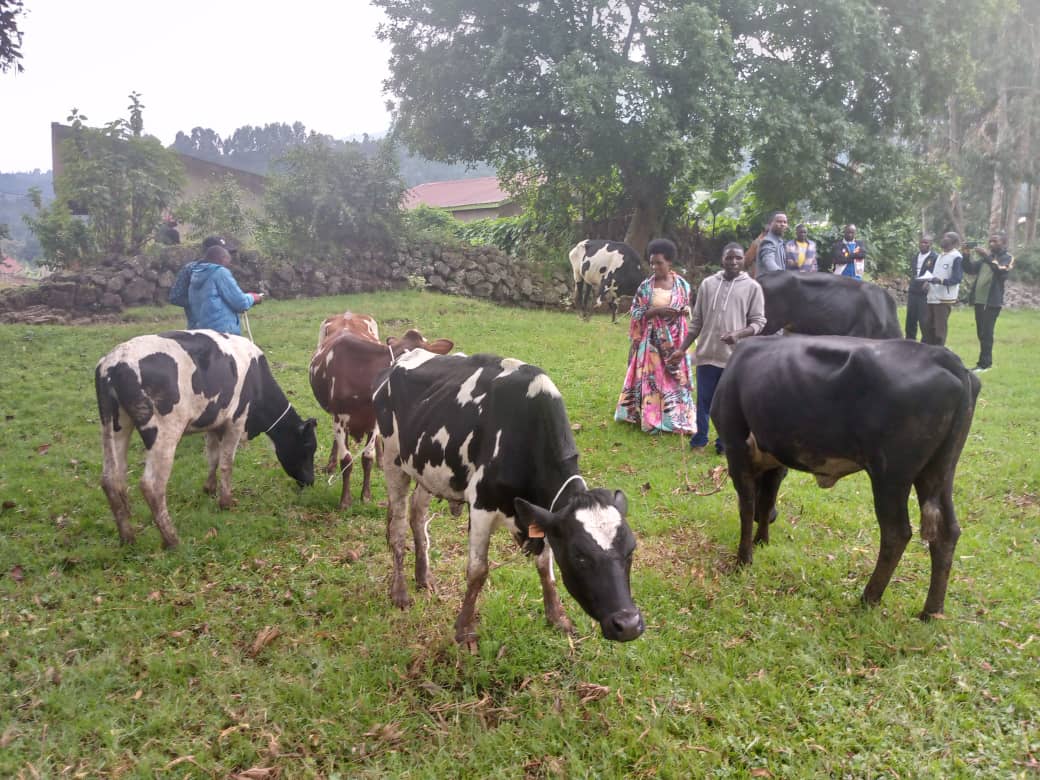Transforming Lives: How Rwanda Changed Poachers into Conservationists

Once notorious poacher in Shingiro, one of the twelve sectors making the belt of Rwanda’s Volcanoes National Park-northern Province, Rekayo Boniface has become a gorilla activist after seeing his life transformed by the Tourism Revenue Sharing Program.
At the age of 27, back in 1997, Rekayo began poaching animals in the park, following his father’s footsteps. For nearly a decade, he became an enemy of the park’s fauna.
“I was a highly skilled hunter, learning from my father whom I used to escort to carry the carcass of our game. After he passed away, I took over from him,” he confessed during an interview on August 15th, 2024.
“I used to hunt antelopes and buffaloes and might have killed animals in hundreds because I was an avid hunter.”

For several decades, poachers sustained hostilities against the park’s wildlife, until 2003, when the government of Rwanda decided to make the park’s neighboring communities a key partner trough the tourism revenue sharing program.
Kwizera Janvier, a Community Conservation Warden with the Rwanda Development Board (RDB) in Volcanoes National Park who is in charge of community engagement and partnerships in park conservation explains that before this program, poaching was rather a lifestyle.
“In the past, you could ask a child what the park was all about, and they would reply that it was a cash cow,” he said jokingly.
“Nowadays, the narrative has changed; former poachers are participating in the park’s conservation effort and this gives good returns.” According to Kwizera, conservation include among others, solving conflicts that raise between the park and the adjacent community.
On one side, the conflicts raise when animals encroach neighbors’ field and destroy their crops, and sometimes, kill them. On the other side however, the conflict can be fueled by the poachers who go to the park either for firewood, indigenous fruits, herbal medicines and on a big extreme, hunting the animals.
Since 2005, Rwanda resolved to have communities in the outskirts of the parks benefit from the tourism revenues, because they play an important part in protecting the wildlife against any eventual harm.
“At the beginning, Rwanda allocated 5% of tourism revenues from national parks to the communities, but the scheme was increased to 10% later on,” Kwizera said.

Beneficiaries of the initiative are local communities living near national parks in 12 districts.
Ten years after tourism revenue sharing began, Rekayo, 54, and his neighbors became aware of the benefits of protecting Volcanoes National Park, home to more than 1,000 mountain gorillas and they have become gorilla conservationists.
With a tone of regret, he narrates:” I stopped poaching because I realized it was putting my life in danger. On several occasions, I narrowly escaped the furry of buffaloes which wanted to revenge,” he said.
“Moreover, on several occasions, park rangers arrested me and I could spend some days behind bars which was a loss to me, my entire family and the country at large.”
After several adversities Rekayo whose name loosely means ‘just stop’ decided to call it quit after sensitization of members of KOUSHI, a cooperative predominantly of former poachers.
KOUSH has a long history. In 2008, it started as an association of former poachers who came together to protect their farms against buffaloes’ invasion. In 2013, it grew as a cooperative of potatoes farmers and crops multiplication.
The Rwanda Development Board(RDB) which is in charge of conservation largely supported the cooperative which quickly grew to include 50 former poachers. In 2016, Rekayo joined the cooperative.
“It took us several years to convince Rekayo to join us because he was a notorious hunter who even had a group of poachers – urukemba- under his command,” said Eliezer Twizeyimana, the cooperative president.
Twizeyimana recalls that in the testimony of poachers who ended up joining their cooperative, they said that they were taking the park as their source of income.
One of them for example, told us that he used to slaughter an antelope to sell the meat at Rwf 1300($1) per kilogram against the Rwf 5000 ($3.8) per kilogram of meat in butcheries of allowed domestic animals.
“A poacher would take home Rwf 15,000 ($11.5) and feel that it is good deal. Some of them confessed that they would go to the bar where they would drink and promise the barman to pay when they come back from the forest(park),” recalls Twizeyimana.

Rekayo still has such memories, and he recalls that it took him two years to abandon the forest, but one single day, he made a U turn.
“When the cooperative recruited me, my fellow members told me that if I kept going to the forest, I would die from there. They showed me that the cooperative could help me instead of risking my life there,” recalls Rekayo.
Actually, Rekayo had remained adamant to quit poaching for two years of sensitization, until he was told that he would be given something greater than the meat.
“They gave me a cow, which was a game changer-it meant milk and manure; all this means money because you sell milk for money, you grow crops and reap big-it’s all money and this was good deal rather,” Rekayo said.

In this cooperative, every member has become a livestock farmer, with at least one cow, thanks to RDB’s support which supplements their contributions that allow them to support each other.
For Rekayo, he already has two cows. A cow is very important in Rwanda’s economy because it procures milk which is very essential in nutrition. Stunting in Rwanda stands at nearly 35 per cent among the under five children. Families without a cow are more at risk.
“I am grateful because the cooperative changed my life. I am free from poaching for ten years now,” Rekayo said.
“I gained absolutely nothing from poaching, but ever since I joined, my life changed,” he said.
Currently, Rekayo is earning like an average civil servants in Rwanda, courtesy of KOUSHI cooperative.
“In total, I earn about Rwf 350,000 ($270) a month from farming and other work,” he said, smiling.
“I don’t sell all the potatoes that I grow because I have a family. When I harvest a ton, I sell about 400 kilograms and keep the remaining 600 kilograms for family meal.”
Changing poachers’ minds was hard.
Rekayo is not the sole in this saga of poaching because some started even when they were still teenagers. Mukangahe Saïd, 37, was once a poacher. He confessed having killed at least four buffaloes that encroached his village.
“I started poaching when I was under 18. I attacked every buffalo that came to my village and the wise one would return quickly or be pierced by my spear,” he said slapping his lap.
While many young men in Musanze learned to hunt from their fathers, one group of people like Mukangahe learned by watching people bring home meat from the animals they killed.
In a sign of swearing to God, Mukangahe said: “It was not easy to change your mind to stop poaching because it felt like you were losing something”.
According to Kwizera, before the intervention of RDB, the community was poor some families incapable to afford even a chicken.
Most of them thought they could take whatever they needed from the park.
“Poor living conditions were common; dilapidated houses, poor diet, etc.. But today, cooperatives grow potatoes where they can harvest enough for themselves and sell the surplus.
Others work as porters for tourists which also earns them good money.

He is also a member of the KOUSHI Cooperative.
“My neighbor, the president of the cooperative, told me there were no benefits in poaching. When I joined the cooperative, I was given a cow which enable me to do farming with profit,” he said.
“Every farming season, I earn up to Rwf 700,000 Rwandan francs (about 500 USD) and there are two planting seasons in my village.”
Like his predecessor, Mukangahe also recalls that poaching was a risky adventure with people coming back injured or bruised. Today, he is a conservationist.
“When a buffalo encroaches our village, we inform the village authorities and guides, who arrive within 10 minutes to help return it to the park, “he said.
Economic benefits of conservation programs.
Rwanda’s Tourism Revenue Sharing Policy supports local communities around national parks, known as the Zone of Influence, which includes 12 sectors as far as Volcanoes National Park is concerned.
The scheme was introduced to help communities improve their livelihoods and gain a better understanding of park conservation.
Over the years, Rwf 5,028 billion has been allocated to projects destined to communities including infrastructure, cooperative support, social support for vulnerable families, physical deterrents, and relief efforts. These initiatives have made a significant difference in the community.
For example, Rwf 1.7 billion went to funding for cooperatives, which includes the provision of cows, sheep, seeds, support for handicrafts and forestry.
Another Rwf 160.2 million went to vulnerable households who were given livestock, especially cows and sheep which increased their agricultural income and thus, ushered them into food security.
According to Kwizera, on top of the community at large, the Tourism Revenue Sharing Program, supports 80 cooperatives including 6,000 members.
These efforts help cooperatives become more productive and sustainable, thereby improving the lives of their members.
This story was produced with the support of the Vanishing Treasures programme and GRID-Arendal.

